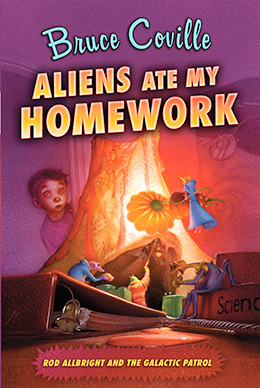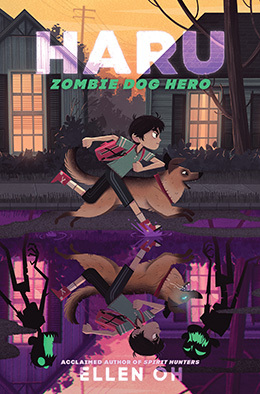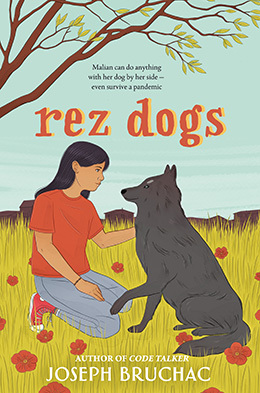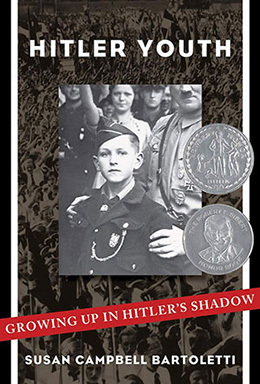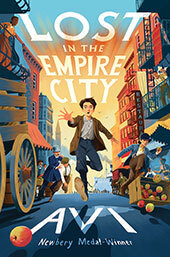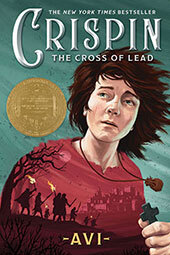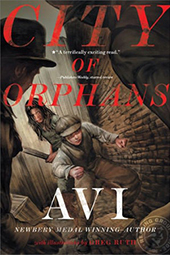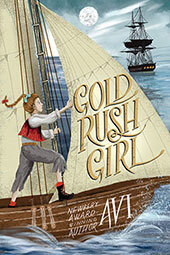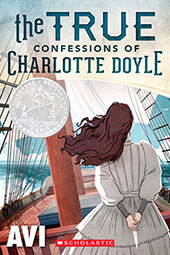Avi's Blog, page 7
July 30, 2024
Summer Blog Series: Rebecca Kai Dotlich
From Avi: As I did in the summer of 2023 and the summer of 2022, I’ve invited 13 admired middle grade authors to write for my blog for the next three months. I hope you’ll tune in each Tuesday to see who has answered these two questions we’re frequently asked by readers. You should have a list of terrific books to read and share by the end of the summer … along with new authors to follow!
Some poems come from the heart, but they also come from the backyard, the sky, or the walk to school. A poem can be made of the thing that makes you double over laughing, or of the emptiness you feel when sadness settles in. When words are cobbled together to tell about rain clattering on the roof, wind whooshing through trees, a thunderstorm or the wonder of stars, that thing we call a poem has been written.
Where did you get your idea for a specific book of yours?
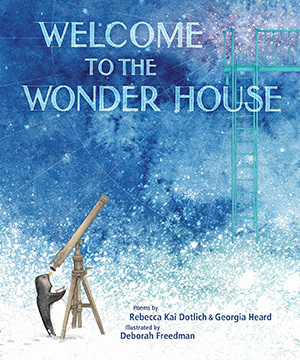
You might, or might not, love words. And you might, or might not, know it. Words that are delicious alone. Words that fit together like a puzzle. Words that say something to soothe your heart or make you think or make you laugh out loud. And, you might get a kick out of, or feel a bit of happiness when you hear a certain rhythm, or something repeated over and over, words strung together that you come to know by heart. You might be shrugging your shoulders. Probably you’ve never thought about it. As a young girl, I didn’t know that’s what I was feeling. I didn’t name it, I just knew I loved hearing, saying, (and still do,) things like … Fee Fi Fo Fum, I smell the blood of an Englishman. Be he alive or be he dead, I’ll grind his bones to make my bread. Shiver. Loved it. Or I can never forget Take me out to the ballgame, take me out to the crowd, buy me some peanuts and Cracker Jack, I don’t care if I never get back …my older brother listened to that song so often that it is stamped onto my brain. Songs, images, poems; they are all a type of singing, full of memory and mystery, noticing, reading, writing, and repeating. I was never able to memorize poems, and still can’t. Unless they are short. Unless they rhyme. Unless they have rhythm. Then, maybe. Almost. Sometimes. And another truth is, poems don’t have to rhyme. What about this: I hear bells ringing from far, far away, even while the horns honk and the dogs bark and the puddles splash. Those few images create a small poem about a noisy moment in time. There is a hint of rhythm, but there is no rhyme.
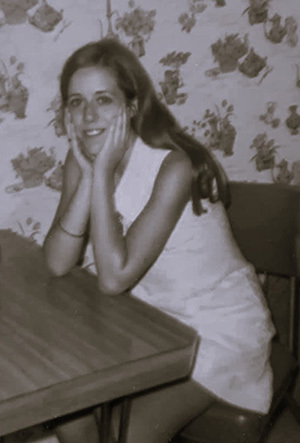 I have written poetry since I was about eleven. I still have a few of those poems. One was about being in class, watching the clock and wanting to go home, another was about my best friend as I watched her walking outside my window, one was about a boy, one about my little sister, one about death, and one was full of silly nonsense. None of these were good poems. And it didn’t matter. Writing them made me happy. It became a hobby. I wrote on tablets, on notebook paper, in diaries, and on the backs of used business papers my dad brought home from the office. At one point my grandfather gave me his old typewriter and I fell even deeper into the world of words along with the sound of click clacking while I typed. (I hadn’t learned to type yet, I just punched one key at a time.) I had things I wanted to say, and so I said them. Word after word, and line after line. Some poems rhymed and some did not. I don’t remember worrying about ideas, or how to get an idea, I just wrote what I was feeling, seeing, and thinking.
I have written poetry since I was about eleven. I still have a few of those poems. One was about being in class, watching the clock and wanting to go home, another was about my best friend as I watched her walking outside my window, one was about a boy, one about my little sister, one about death, and one was full of silly nonsense. None of these were good poems. And it didn’t matter. Writing them made me happy. It became a hobby. I wrote on tablets, on notebook paper, in diaries, and on the backs of used business papers my dad brought home from the office. At one point my grandfather gave me his old typewriter and I fell even deeper into the world of words along with the sound of click clacking while I typed. (I hadn’t learned to type yet, I just punched one key at a time.) I had things I wanted to say, and so I said them. Word after word, and line after line. Some poems rhymed and some did not. I don’t remember worrying about ideas, or how to get an idea, I just wrote what I was feeling, seeing, and thinking.
Now that I am a grown-up writer, I’m asked quite a bit where I get my ideas for poems. The truth is, not much has changed, except I enjoy studying the craft of poetry, comparing one thing to another, taking time to notice, to observe all the details that I can, choosing words, making word lists, finding the just-right word. And I usually begin by praising something. But before I can praise it, I fall in love with it for just a moment. And even before that, I question it, feel amazed by it, marvel at it. This might be windshield wipers sloshing back and forth, holding a cold, glassy marble in my hand, watching the whirling spokes of a bicycle, looking at a starfish, a shadow, the heart shaped rock, a penny on the sidewalk, a kite caught in a tree, a tiny frog or a cluster of clouds.
Poems don’t have to be about big, complicated things. But they can be. I’ve written about a friend moving away, missing my grandfather, and being lonely.
What’s your best writing advice for young writers?When you think you might want to write a poem, have your curiosity, your heart and your notebook ready to explore, imagine and notice. And have your Thesaurus and Rhyming Dictionary close by, too. Dream, wonder, be open to possibilities, then don’t second guess or doubt yourself, just put it on the page.
Particulars
Rebecca Kai Dotlich
Rebecca is a word collector, poet and picture book author who has written and published dozens of children’s books, including Lemonade Sun, One Day The End, The Knowing Book, What Is Science? Grumbles From the Forest (co-authored with Jane Yolen) and most recently Welcome To The Wonder House, (co-authored with Georgia Heard.) Rebecca’s poems have been included in children’s poetry anthologies by Lee Bennett Hopkins and Paul B. Janeczko, as well as J. Patrick Lewis, Jane Yolen, Georgia Heard, Jack Prelutsky, Kenn Nesbit, Charles Waters and Irene Latham. Her books have been awarded a Boston Globe Horn Book Honor, The 2024 Lee Bennett Hopkins Poetry Award, a Golden Kite picture book Honor, a Bank Street Best and a Subaru SB&F Prize finalist. Her poems also appear in dozens of textbooks and magazines. She grew up in Indiana where she spent her days reading comic books and mysteries, ice skating on nearby ponds, building snow forts, and riding her bike on dirt trails by the creek. She spends most of her time in her writing room filled with vintage typewriters and small toys like cars and trolls, marbles and jacks. She can never have enough school supplies: colorful notecards, notepads, and folders. And books! Piles of books! She’s a doodler, a scribbler, and a notebook keeper. Her favorite foods are spaghetti and pot pies.
Home Facebook InstagramJuly 23, 2024
Summer Blog Series: Bruce Coville
From Avi: As I did in the summer of 2023 and the summer of 2022, I’ve invited 13 admired middle grade authors to write for my blog for the next three months. I hope you’ll tune in each Tuesday to see who has answered these two questions we’re frequently asked by readers. You should have a list of terrific books to read and share by the end of the summer … along with new authors to follow!
Where did you get your idea for a specific book of yours?One of the most common questions I get in school visits is, “How long does it take to write a book?”
I answer with a question of my own: “Well, where should I start counting from? Is it from the time I had the experience that inspired the idea? Or from the time when I first realized it might be the root of a story? Or when I started to make notes? Or when I wrote an outline? Or do you mean how long from when I actually sat down and started writing?”
I think the truest answer is that the time it takes to write a story is how old you were when you finished writing it. Because when you’re writing, really writing, you draw on everything you’ve experienced from the time you were born up to that moment.
In the case of Aliens Ate My Homework, the seed for the story came from some imaginary friends that my across-the-street neighbor and I cooked up when we were 8 or 9 years old: a group of six-inch-high aliens that we put through various problems and adventures.
More than thirty years later I needed an idea for a contract I was negotiating. Remembering those little aliens, I came up with the title Aliens Ate My Goldfish! (My thought was that the cover would show six little aliens roasting a goldfish over a campfire on top of the main character’s dresser … ) Later I remembered the classic excuse “My Dog Ate My Homework” and changed the title to Aliens Ate My Homework, which everyone thought was a much better idea. (To be honest, it would have been hard to find a worse one!)
To write that book I did something I’d never done before: I based the main character, Rod Allbright, totally and completely on my kid-self. Everything from his basic clumsiness to his total and complete inability to tell a lie (and the reason for that!) were based on me.
One of the most basic rules of writing, repeated endlessly by writing teachers and editors, is “Write what you know!” With Aliens Ate My Homework, I was literally mixing what I knew (my family, my childhood home, my best friend) with some wild imaginings.
What’s your best writing advice for young writers?Which leads to one of the most important pieces of advice I can give a young writer: “Keep a Journal!”
Keeping a journal is like writing a letter from your current self to the self you will become. It is amazing how much a single sentence in a journal can pull up a complete memory. So much is stored in our brains, but we can’t always get at it. The journal is a key to your past, a key to your life, and a great tool for handing you story ideas!
Particulars
Bruce Coville
Home FacebookJuly 16, 2024
Summer Blog Series: Karen Cushman
From Avi: As I did in the summer of 2023 and the summer of 2022, I’ve invited 13 admired middle grade authors to write for my blog for the next three months. I hope you’ll tune in each Tuesday to see who has answered these two questions we’re frequently asked by readers. You should have a list of terrific books to read and share by the end of the summer … along with new authors to follow!
Where did you get your idea for a specific book of yours?
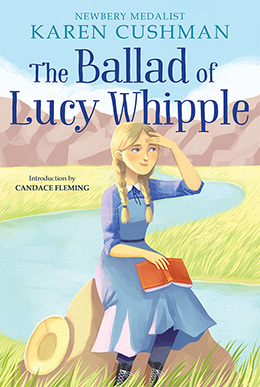
Ideas are like Legos. One is just a plastic block but put many together, and you have a castle or a ship–or a story. The blocks for The Ballad of Lucy Whipple began with a road trip through the foothills and mountains of Northern California. I saw the remains of historic towns and buildings and gold mines. We drove in a tough, new SUV and still sometimes had a hard time on the old, hilly, unmaintained roads.
I thought about how much harder it would it have been a hundred years ago when people traveled there these roads by cart, on horseback, or on foot. Where would the nearest doctor be? Or firefighters? Or groceries? And I imagined a young girl coming west. How would she feel about the move? What would she miss from home?
And I remembered when my family moved to California when I was eleven, and I lost my grandparents, my dog, and my public library. The two characters — the girl in my imagination and me — combined and became Lucy Whipple. And the book began.
What’s your best writing advice for young writers?My advice is in three parts (I hope that’s not cheating): Read a lot, write a lot, and listen well.
Read a lot. Fill your head with stories. Read silly books and glorious books, sad books and funny books, library books and ebooks. Read to learn things, feel things, remember things. Read to see how authors solve problems or keep your attention or make you believe that toads and otters and even a typewriter can talk. Discover what you like to read and why. Reading will open worlds to you so you can see beyond the boundaries of your own experience.
Write a lot. Exercise your writing muscles. Keep a journal. Make a list of favorite words. Use writing prompts, free writing, your own imagination. Write stories, poems, and songs, a neighborhood newspaper, a movie script. Don’t let the editor take over. You can polish later. Write everyday, if that works for you, or don’t. Just write.
Listen well. Listen to the radio, people talking, street noises. It’s all your material. Watch children play and listen to what they say and why. Elderly people., too. How can you capture them with words? Pay attention to the sound of footsteps, laughter, accents. What makes a person sound sad? Uncertain? Friendly? And listen to silence. What does it say?
Have fun.
Particulars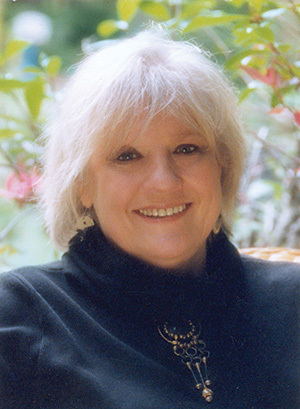
Karen Cushman
Home Facebook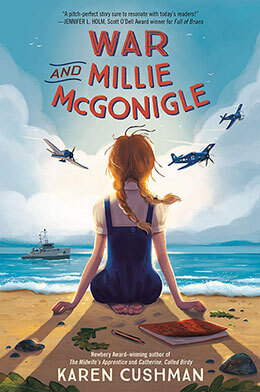
I believe you will also enjoy:
War and Millie McGonigle
Millie McGonigle lives in sunny California, where her days are filled with beach and surf. It should be perfect—but times are tough. Hitler is attacking Europe and it looks like the United States may be going to war. Food is rationed and money is tight. And Millie’s sickly little sister gets all the attention and couldn’t be more of a pain if she tried. It’s all Millie can do to stay calm and feel in control.
Still — there’s sand beneath her feet. A new neighbor from the city, who has a lot to teach Millie. And surfer boy Rocky to admire — even if she doesn’t have the guts to talk to him.
It’s a time of sunshine, siblings, and stress. Will Millie be able to find her way in her family, and keep her balance as the the world around her loses its own?
July 9, 2024
Summer Blog Series: Jolene Gutierrez
From Avi: As I did in the summer of 2023 and the summer of 2022, I’ve invited 13 admired middle grade authors to write for my blog for the next three months. I hope you’ll tune in each Tuesday to see who has answered these two questions we’re frequently asked by readers. You should have a list of terrific books to read and share by the end of the summer … along with new authors to follow!
Where did you get your idea for a specific book of yours?
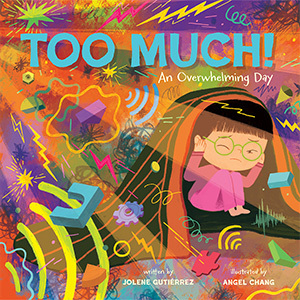
I’d love to tell you about my picture book, Too Much! An Overwhelming Day. One day while I was thinking about how I was overwhelmed by lots of things when I was a child, the words, “Too loud! Too bright! Too itchy! Too tight!” came into my mind. I’m still overwhelmed by loud noises, bright lights, and itchy, tight clothes, and I know lots of kids who are overwhelmed by different things like that, too. Because the “Too loud! Too bright! Too itchy! Too tight!” stanza was in an ABCB rhyme scheme, I knew I’d be writing in rhyme.
Even though rhyme and rhythm are a challenge for me, I knew I wanted to tell this story. I thought that by writing about a day that is stressful and overwhelming, I would help some readers see themselves in this book and I would help others understand what being overwhelmed feels like. I also wanted the main character to have the opportunity to advocate for herself and find a way to calm herself, which she does.
[Ed: Jolene shared that Too Much! An Overwhelming Day isn’t even a year old and it’s already being translated into seven languages. Congratulations!]
What’s your best writing advice for young writers?If you want to become better at anything, you’ll need to:
Research, or learn about the thing, and Practice and grow your skills. Bonus points for perseverance!This is true for things like riding a bike, math skills, and cooking. It’s also true for writing. Some people are talented in different areas but most people who succeed at something do so because they’ve worked really, really hard. My interest in writing started when I was young and I was supported by people like my mom who read with me and my 2nd grade teacher who “published” my stories for me. As an adult, I kept reading books for young readers because I’m a school librarian (that’s the “Research” part) and in 2008, I decided I wanted to write with the goal of publication. I wrote and wrote and wrote (that’s the “Practice” part) and after 10 years of practicing, my first picture book was published (that’s the “Perseverance” part).
Particulars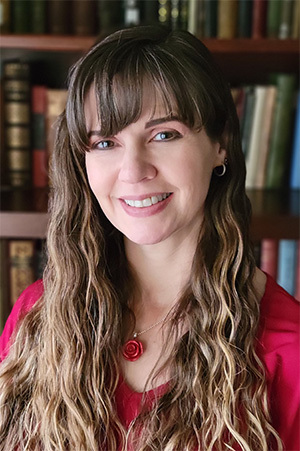
Jolene Gutiérrez
Home Twitter Instagram Facebook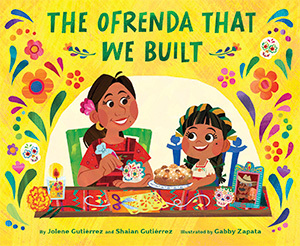
Available August 6, 2024,
co-authored with Shaian Gutiérrez, Jolene’s daughter:
The Ofrenda That We Built
It is Día de los Muertos—the Day of the Dead—and the family ofrenda is at the center of the celebration! Inspired by the popular nursery rhyme “The House That Jack Built,” The Ofrenda That We Built invites readers to join in the building of a colorful ofrenda, a home altar full of symbols and meaning, one special element at a time.
This is truly an intergenerational holiday with deep familial love at its heart. Readers will recognize these moving and universal themes in the hands-on activity of building an ofrenda together, an accessible way of learning more about other cultures and celebrations. Told in warm and welcoming rhyme, with beautiful, immersive illustrations, this is a delight for readers of all backgrounds to enjoy when the holiday arrives each autumn or any time of year that calls for remembrance and connection with loved ones.
July 2, 2024
Summer Blog Series: Steve Sheinkin
From Avi: As I did in the summer of 2023 and the summer of 2022, I’ve invited 13 admired middle grade authors to write for my blog for the next three months. I hope you’ll tune in each Tuesday to see who has answered these two questions we’re frequently asked by readers. You should have a list of terrific books to read and share by the end of the summer … along with new authors to follow!
Where did you get your idea for a specific book of yours?
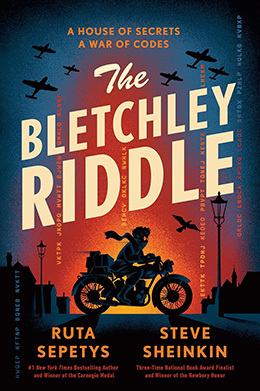
Secret codes — that was the spark for my upcoming collaborative novel, The Bletchley Riddle. I’ve always been drawn to the hidden world of codes and ciphers, fascinated by the ways quirky codebreakers have impacted major moments in history. For years it’s been a topic I was determined to “do something” with at some point. I figured it’d be narrative nonfiction, like most of my books.
But then, a few years ago, the great young adult novelist Ruta Sepetys and I started batting around the idea of writing a book together. The idea of setting a story at Bletchley Park — Great Britain’s top secret codebreaking center during World War II — really grabbed both of us. We’re a couple of research nerds, and proud of it! We had an amazing amount of fun learning about this Wonka-like codebreaking factory, exploring hidden history, creating teenage characters, and crafting a mystery full of puzzles and hidden history.
What’s your best writing advice for young writers?To continue what I was saying above — let curiosity be your guide. People often say you should “write what you know.” Yeah, maybe. I think it’s more important to focus on something that fascinates you, something that really fires your curiosity. Of course you have to be willing to do a bit of research along the way.
It’s like cooking — they say you can “taste the love” a cook puts into their food. That’s definitely true of writing. You can tell if a writer was fully engaged, if they were having fun as they were writing. Sure, in school it’s not always possible to pick your own subjects for writing assignments. But if we’re talking about something you actually want to write, let it be something you’re obsessed with, something you just can’t wait to tell other people about. What if it’s something weird or obscure? Even better! If you’re genuinely interested, you can get readers into it too, and your love of the story will come across in your writing
Particulars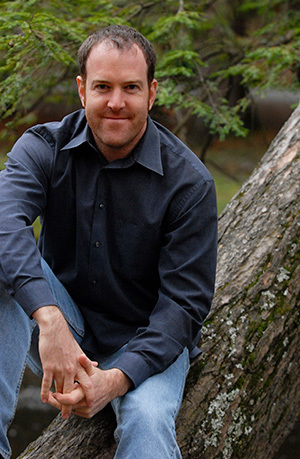
Steve Sheinkin
Home Twitter Instagram Facebook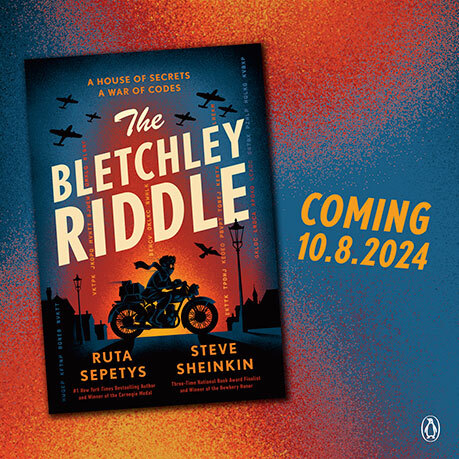
Available Oct 8, 2024,
co-authored with Ruta Sepetys:
The Bletchley Riddle
Summer, 1940. Nineteen-year-old Jakob Novis and his quirky younger sister Lizzie share a love of riddles and puzzles. And now they’re living inside of one. The quarrelsome siblings find themselves amidst one of the greatest secrets of World War II—Britain’s eccentric codebreaking factory at Bletchley Park. As Jakob joins Bletchley’s top minds to crack the Nazi’s Enigma cipher, fourteen-year-old Lizzie embarks on a mission to solve the mysterious disappearance of their mother.
The Battle of Britain rages and Hitler’s invasion creeps closer. And at the same time, baffling messages and codes arrive on their doorstep while a menacing inspector lurks outside the gates of the Bletchley mansion. Are the messages truly for them, or are they a trap? Could the riddles of Enigma and their mother’s disappearance be somehow connected? Jakob and Lizzie must find a way to work together as they race to decipher clues which unravel a shocking puzzle that presents the ultimate challenge: How long must a secret be kept?
June 25, 2024
Summer Blog Series: Ellen Oh
From Avi: As I did in the summer of 2023 and the summer of 2022, I’ve invited 13 admired middle grade authors to write for my blog for the next three months. I hope you’ll tune in each Tuesday to see who has answered these two questions we’re frequently asked by readers. You should have a list of terrific books to read and share by the end of the summer … along with new authors to follow!
Where did you get your idea for a specific book of yours?I love dogs. I have two of my own that I spoil more than my human children. Kiko is a very sweet golden doodle and Tokki is a grumpy coton. And their favorite thing to do is to sit very close to me and stare at me with their big adorable eyes whenever I’m eating anything, but particularly popcorn, which they love. One day as I was eating popcorn and Kiko and Tokki were sitting so close, they were literally in my lap, and I thought to myself, “If there was a zombie apocalypse, Kiko and Tokki would always protect me, even if they turned into zombies. As long as I had popcorn.”
And that is how the idea of Haru, Zombie Dog Hero came from. And even though it can be scary, I mean zombies are frightening!, at the heart of the book, it is really about that deep and mutual love between a boy and his dog best friend.
What’s your best writing advice for young writers?If you really want to be a writer you have to persist and finish. Persist against all the self doubts and obstacles life can throw at you. And finish the story that you started to write. To be a writer, it isn’t just about writing, it’s about having a finished product whether it is a poem, a short story, or a novel. You must finish.
Particulars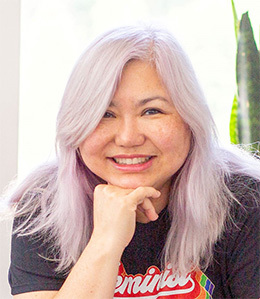
Ellen Oh
Home Twitter Instagram Bluesky_logo_ffffff .fil0 {fill:#FFFFFF}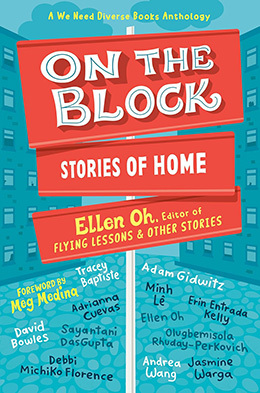
Available Oct 22, 2024,
edited by Ellen Oh:
On the Block: Stories of Home
Welcome to the Entrada, home to these everyday Americans, including the new kid on the block, who is both homesick and curious; a Popsicle-bridge builder, a ghost hunter, and a lion dancer; their families, friends, and neighbors from all around the world!
Published in partnership with We Need Diverse Books, this anthology features award-winning authors Tracey Baptiste, David Bowles, Adrianna Cuevas, Sayantani DasGupta, Debbi Michiko Florence, Adam Gidwitz, Erin Entrada Kelly, Minh Lê, Ellen Oh, Olugbemisola Rhuday-Perkovich, Andrea Wang, and Jasmine Warga. These inspiring stories celebrate family, friendship, culture, and American immigrant life today.
June 18, 2024
Summer Blog Series: Joseph Bruchac
From Avi: As I did in the summer of 2023 and the summer of 2022, I’ve invited 13 admired middle grade authors to write for my blog for the next three months. I hope you’ll tune in each Tuesday to see who has answered these two questions we’re frequently asked by readers. You should have a list of terrific books to read and share by the end of the summer … along with new authors to follow!
Where did you get your idea for a specific book of yours?There are a number of things about my new, middle grade novel, Rez Dogs that make it different from any book I’ve done before. In fact, before I go any further, I should point out that, even though I am listed as the author, I did not write it.
Nope — I dictated it into my cell phone.
At this point, let me back up about five years. That’s when we got a new puppy, a rather large miniature poodle, we named Kiki, (By the way, that’s not a French name. Ki means earth in the Abenaki language.) The Kiker is an enthusiastic high-octane baby, and if she doesn’t get her morning walk, she’s about to burst. Those morning walks come at the time when I was usually writing before she came along. But I figured out how to do two things at once. With her leash in my left hand and my cell phone in my right hand, I could talk into that little word-catching device anything I might otherwise be tapping into my computer. Then send it to myself in an email. Which email I would paste into a file and revise as needed.
At first, what I was dictating were haiku. I have been composing at least one every day for the last five years. (Over 1800 at last count.) Then I began to talk about things I was remembering and things I was seeing as we watched the change of seasons on our morning strolls. Much of that ended up in a new nonfiction book of mine called A Year of Moons.
And then came Covid. It interrupted a lot of things for me, especially travel and seeing other folks. But it did not totally change the life that my wife Nicola and I were living in our cabin on a nature preserve in the Adirondack foothills. We still had plenty of room to go outside, and I could take my long morning walks on the deserted logging road that runs past our property.
Because of Covid, my thoughts often turned to what young people were experiencing as a result of the enforced lockdowns all around the world. Then I began to think more specifically about how it was affecting Reservation communities. I have been to many of them over the last half century and have a lot of friends there. In my mind’s eye, I began to see a young woman on one of those communities — such as Indian Island or Pleasant Point in Maine. Then I saw a dog by her side. Not a poodle like my partner Kiki but one of the old reservation dogs that looks at least half wolf. And that is when I knew I had to tell their story, and the title for the book came to me.
That title, I should point out, was chosen before my favorite new TV series appeared — the one named Reservation Dogs that focuses on several modern-day Native teenagers and an Oklahoma reservation. (Quite a few folks I know have been in that show and I even have pictures in my phone of some of them posing in past years with me.)
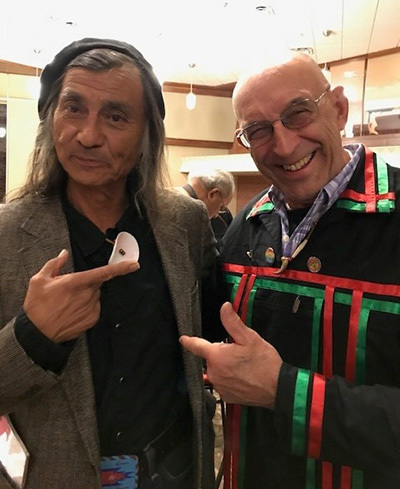 Richard Ray Whitman of Reservation Dogs and Joseph Bruchac
Richard Ray Whitman of Reservation Dogs and Joseph Bruchac Another different thing about my novel is that it ended up being written in verse. That was a first for me — although it will not be my last. I’ve just completed another novel in poetic form and I’m working on a third one.
I did not know I was composing it as poetry until I finished the first chapter and then read it aloud to myself—something I do with everything I write. That was when I realized my line breaks and the flow of the narrative had a poetic rhythm, one that matched the rhythm of my walking. Considering that the term “feet“ is regularly used in poetry, that should not have been surprising to me.
Another aspect of the novel is that it is built around traditional stories being narrated by my main character’s grandparents. And all of those stories relate to dogs. That is another thing I had not planned. It just happened. But it is true that throughout my own life, dogs have always been there. In fact, dogs play a major role in a number of my books, including a historical fantasy written for young adults — re-edited and about to be re-issued — a novel named Dawn Land.
Further, insofar as Mali listening to those stories her grandparents tell her, lesson stories that relate to Mali’s life, that’s also something that ties into my own life. I was raised by my grandparents and wherever I’ve gone — including my travels in Europe and Africa — I’ve always gravitated to elders who had stories to tell. So, you might say, Mali is a bit like me.
What’s your best writing advice for young writers?Thinking back on my own life and whatever success I’ve been fortunate enough to enjoy as an author, there’s one piece of advice I like to pass on to young writers. It’s simple, but some folks find it hard to do. BE A GOOD LISTENER.
I’ve heard it said by many elders that we humans were given two ears and only one mouth — so we were meant to listen at least twice as much as we talk. It’s amazing the things you can learn if you just listen and keep listening.
Particulars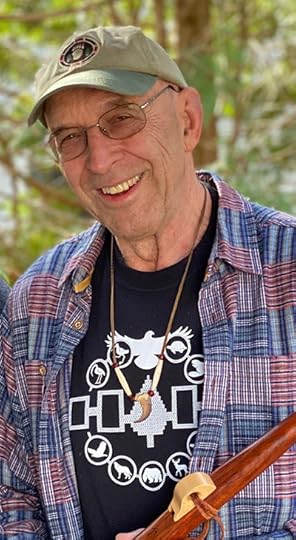
Joseph Bruchac
(photo by Trish Miller)
Home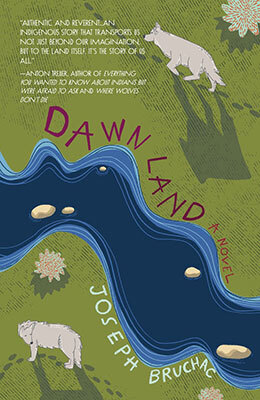
A recent book by Joseph:
Dawn Land
About ten thousand years ago in the northeast, the Abenaki — People of the Dawn Land — created a thriving community in social and ecological balance with nature and with each other. One of the finest sons of the People is Young Hunter, who dedicates himself to becoming a pure hunter. But a shadow is crossing over this place, threatening his beloved homeland, and Young Hunter is called to its defense. The deep-seeing one of his village, Bear Talker, tells him that the change will be brought by beings of great power, with cold hearts and a terrible hunger, and Young Hunter has been chosen to fight them. “This young one will do things for the people,” Bear Talker thought. “If he survives … if he survives.”
June 11, 2024
Summer Blog Series: Susan Campbell Bartoletti
From Avi: As I did in the summer of 2023 and the summer of 2022, I’ve invited 13 admired middle grade authors to write for my blog for the next three months. I hope you’ll tune in each Tuesday to see who has answered these two questions we’re frequently asked by readers. You should have a list of terrific books to read and share by the end of the summer … along with new authors to follow!
Where did you get your idea for a specific book of yours?One of my most popular books is based on a true story.
In the midst of researching and writing a nonfiction book, Hitler Youth: Growing Up in Hitler’s Shadow, I visited the city of Nuremberg in Germany.
This is the city where Adolf Hitler held massive Nazi party rallies during the 12 terrible years called the Third Reich. This is the city where Hitler blatantly showcased his glaring violations of the terms of the Treaty of Versailles.
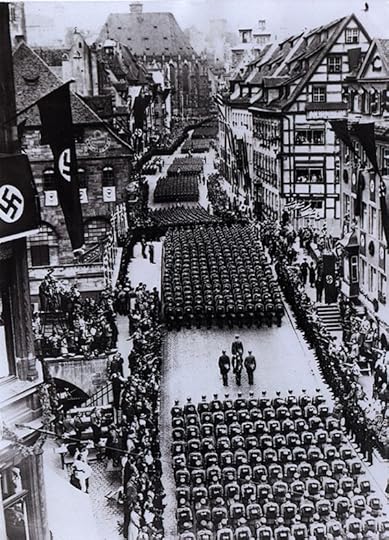
In Nuremberg, I stood on the concrete podium where Hitler had once stood. I looked over the now-decaying Zeppelin field where Hitler addressed hundreds of thousands of Nazi soldiers. In plain view of the world and world leaders, Hitler was building his army and machinery of war.


Standing there, I found myself overcome with immense sadness, and wondering, just as I had wondered as a kid, why no one stopped him.
I knew stories of several German officers who had attempted to assassinate him and failed. I wondered if any young people had protested or formed resistance groups.
This is what I know about young people: Young people have a strong sense of justice. They know right from wrong. They don’t like the fact that life isn’t fair, and they want to fix it.
And yet I also knew this: During the Third Reich, approximately 82% of Germany’s eligible young people between the ages of 10 and 18 who could prove their Aryan ancestry belonged to the Hitler Youth. By law, they had to join. Many, my research and interviews revealed, enjoyed their membership.
This led to the next question: Who were the 18% who didn’t join? Why weren’t they members?
That question — writing is about curiosity — led me to the true story of Helmuth Hübener. At the age of 17, Helmuth was the youngest person on death row in Nazi Germany.

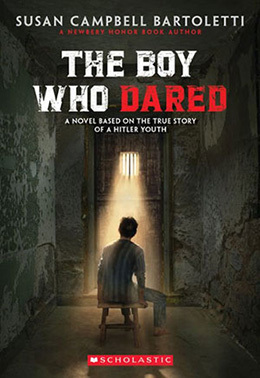 My heart turned over. It led me to the question: What did Helmuth do?
My heart turned over. It led me to the question: What did Helmuth do?
The short answer is this: He was a political prisoner. At a time when the Nazi government banned books and made it illegal to listen to foreign radio broadcasts and to criticize Adolf Hitler, the Nazis, and the war — doing so was punishable by prison or death — Helmuth and his two best friends broke the law. They formed their own resistance group. Their goal was to expose Hitler’s lies and tell the truth about the Nazis and the war.
The long answer — and how Helmuth ultimately saved the lives of his two friends — can be found in my book, The Boy Who Dared.
What’s your best writing advice for young writers?My best writing advice? Be curious. Ask questions. A lot of questions.
I ask a lot of questions. I always have. Even as a kid, I asked a lot of questions. Some were simple yes and no questions (Can I have a goat? The answer was yes. We had a goat named Girdy.)

Others were scientific (If I take my mother’s umbrella to my tree fort and open it and jump, will I float like Mary Poppins? The answer was no, and my mother wasn’t happy about her broken umbrella.)
Some questions helped me make new friends or understand people better or even understand myself (What kind of music do you listen to? Will you be my partner for that project? Am I brave?)
Other questions were philosophical (Why is there war? Why do people hate people they don’t know? Why did people believe Hitler’s lies?) Other questions helped me to understand something (How did World War II start?)
I looked for answers everywhere: from my mother, my teachers, and other adults; from encyclopedias, from newspapers, from books in the library; and from friends. (We didn’t have the internet back then.) I even learned from dumb questions. (I refer you to the umbrella story above and Girdy the Goat turned out to be a bad idea.)
Writing is about curiosity. We don’t need to know all the answers. But we do need to be curious enough to ask questions and to look for answers. We need to know how to take our thinking further.
The world is a puzzling place. (People are puzzling, too.) There are many questions that demand answers. Writing is about finding those questions, asking those questions, and searching for answers. That’s how writers find ideas to write about. It’s our curiosity that drives us to write the story.
Your mind is like a muscle. The more curious you are, the more you exercise your curiosity, the stronger your mind will grow, and the better writer — and thinker — you’ll become. How far are you willing to think? Are you willing to question? Are you willing to look for answers?
Particulars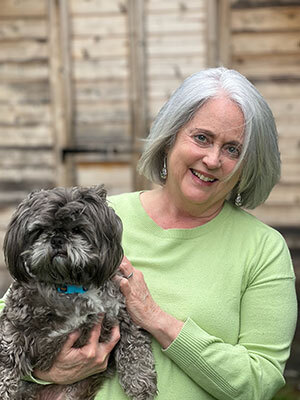
Susan Campbell Bartoletti and friend
(photo: Alia & Mia Rava)
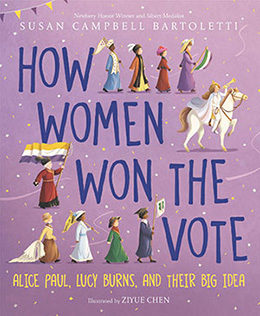
A recent book by Susan:
How Women Won the Vote: Alice Paul, Lucy Burns, and Their Big Idea
In time to celebrate the 100th anniversary of woman suffrage in America comes this page-turning, stunningly illustrated, and tirelessly researched story of the little-known DC Women’s March of 1913.
Enjoy this introduction to suffragettes Alice Paul and Lucy Burns. Paul and Burns met in a London jail and fought their way through hunger strikes, jail time, and much more to win a long, difficult victory for America and its women.
Includes extensive back matter and dozens of archival images to evoke the time period between 1909 and 1920.
June 4, 2024
2024 Summer Blog Series: Avi
By way of introducing my initial book, Things That Sometimes Happen, I made my first school visit in 1970. I cannot begin to count how many times since then I have made such visits. During that very first visit, I was asked (among many other things) two questions. Moreover, the many years I have made such visits those two questions were (and still are) always asked.
Where do you get your ideas? What inspired you to write … ?“Where do you get your ideas?”
“What inspired you to write …………. [fill in the blank].”
I think the two questions are connected.
Consider the word “inspire.” I think for most people it suggests something mystical, as if some god-like spirit, or muse, was whispering an idea directly into my ear. As if it came from the outside.

In fact, “inspire” is Middle English, (1340). To quote the Oxford Unabridged Dictionary, “inspire” (a verb) means “to ‘breathe in’ or infuse (a feeling, thought, idea, principle, etc.) into the mind …”
In other words, being inspired is not so much getting an idea, as it is the act of giving life to an idea you already have. That means being inspired requires you to have an idea in the first place.
Best writing adviceWhich brings us to the second question.
I don’t know when my mother began to read to us every night, but it had to be early. Then too, there were lots of books in our house. A book was a regular birthday and Christmas gift. I had my own library.
My parents wanted to be writers, and they did so professionally. My great-grandparents were writers. So too was my grandmother. My aunt. Hardly a surprise that I was an early reader. A voracious reader.
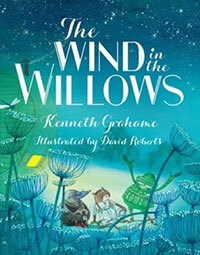
Also, no surprise, I decided to become a writer when I was a senior in high school.
The point is this: Reading so much gave me a narrative mindset that when I experience something or learn about it, I think of it as a written story. I see the world as a story. So as a writer, one of my problems (not a hard one) is that I have too many ideas. My job — as a writer — is to give life to that idea, and shape that idea into a readable story.
Hence my mantra: Writers don’t write writing. They write reading.
What inspires me? Where do I get my ideas? Reading. Reading. Reading.
This summer I have asked writer friends and colleagues to answer these same two questions that I am sure they too are constantly being asked by young people — their readers.
Join me every Tuesday on my blog to see how they answer.
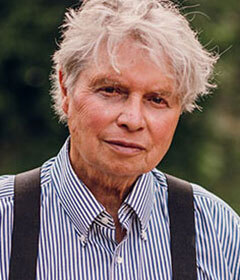 Facebook Instagram Blog Home
Facebook Instagram Blog Home 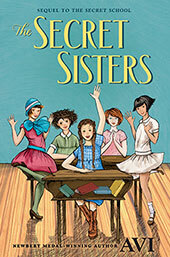
Avi’s newest book!
Subscribe (in right column).
May 28, 2024
Where Research Takes Me
When you write historical fiction, such as I do, my research can take me anywhere and generally does. Such searches are helped by a wonderful truth: there seems to be a book, an article, or a memoir about anything and everything. Search, and you will find, something the research librarian in me loves to do. Indeed, I have a family reputation for spouting odd facts that have no particular relevance to anything, other than to fill a lull in the table conversation.
When writing about the 1911 subways in New York City, (Lost in the Empire City) I located an engineering guide to the then-recent building of the subways, which enabled me to discover that the first subway cars were built of wood.
If you were riding one, you surely would notice that.
When researching the Crispin books, I found a book about Medieval cursing, which was helpful when trying to have the main character, Bear, express himself. The cursing wasn’t scatological as much as mildly sacrilegious, such as “I swear by the bones of Christ.”
Then, for the same Crispin books, I found a book about the medieval forests of England, which was helpful when describing Crispin trying to escape his pursuers.
More recently, the memoir of a Midwest high school principal delineated the curriculum of 1920’s schools, which helped me write my The Secret Sisters. How else would I have learned that the teaching of Latin was considered essential? Or that if young women played basketball using men’s rules — lots of running — it was considered biologically harmful to their reproductive functions.
City of Orphans is, in part, about Danish immigrants living in America at the end of the 19th century. A collection of songs published by the University of Minnesota Press, songs written by Danish immigrants, helped me express the sorrow of the father in the family when things became hard.
Did you know that 19th-century sticks of dynamite used in mining operations were colored orange? Useful in my story for the main character to see — from a distance — what the villain of the story was carrying.
Speaking of Orange, the Hudson River was once called The Orange River. The House of Orange being the ruling family of the Netherlands, who once controlled that area.
What was served by way of food in eighteenth-century taverns? I needed to find out when writing Loyalty. For the same book: Could a boy of thirteen join the British Army? Nope.
For Gold Rush Girl I came upon a description of a nineteenth-century ship sailing about the southernmost point of South America — Cape Horn. It was so cold and wet that the bearded captain of the ship bent over a hot wood stove so the ice in his beard would melt.
For that book, I also came upon a contemporary manual of etiquette that delineated how girls should talk to boys when learning to dance.
Recently I learned about the lack of salt in the American colonies during the revolution. At that time salt had been imported from the Caribbean Islands, but they were controlled by the British. Why was that important? Salt was crucial in the preservation of meats. During the war enterprising colonists — including the state of Pennsylvania — set up salt farms near the sea to extract salt from the ocean waters.
When writing The True Confession of Charlotte Doyle I had to learn about the names of the multitudinous sails on a sailing ship. That was vital when the first mate sang out orders. While researching that I learned that there was a way of getting a sailing ship to sail backward! That’s not something in the book, but I found it amazing. It is sort of like teaching a teenage driver how to back up a car.
Currently, for the book I am writing, I came upon a History of American Hotels.
Invite me to dinner and I’ll be happy to share what I discover. But only when there’s nothing else to talk about.
Avi's Blog
- Avi's profile
- 1703 followers


